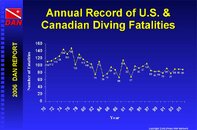It was not intended to be a joke and I'm dead serious !!!
You've been to the Carribean ? Too often have I heard :
"
Got certified 5 years ago while on vacation, and haven't dive since "

... and the DM/Instructor wants to insta-budy me with him !!!! :no
Insta-buddy me with this guy at the rear of the boat who doesn't put on his BC before his weight belt, and doesn't have to be told how to install his 1st stage the right way !!!
Looks can be deceiving, but I probably won't ask this guy's log book or C-card !!!





